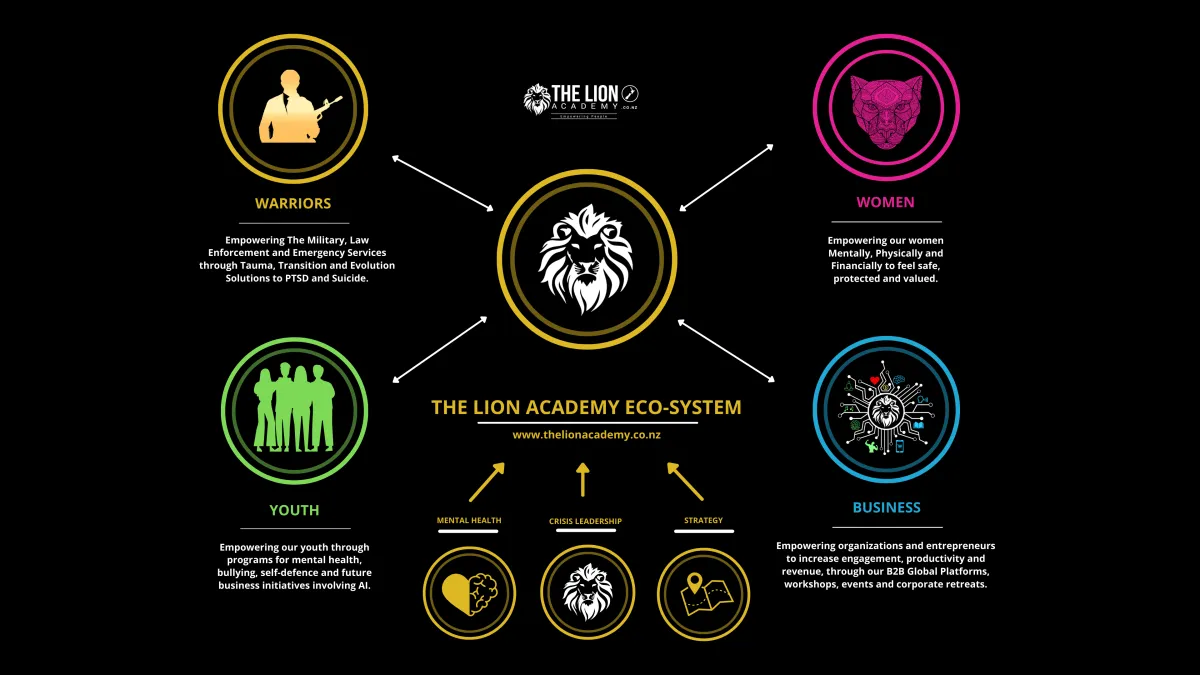INTERNATIONAL EVENT LIVE STREAMED
THE SUICIDE SOLUTIONS SUMMIT NEW ZEALAND
16/17 JUNE 2025 PALMERSTON NORTH

THANK YOU TO OUR SPONSORS
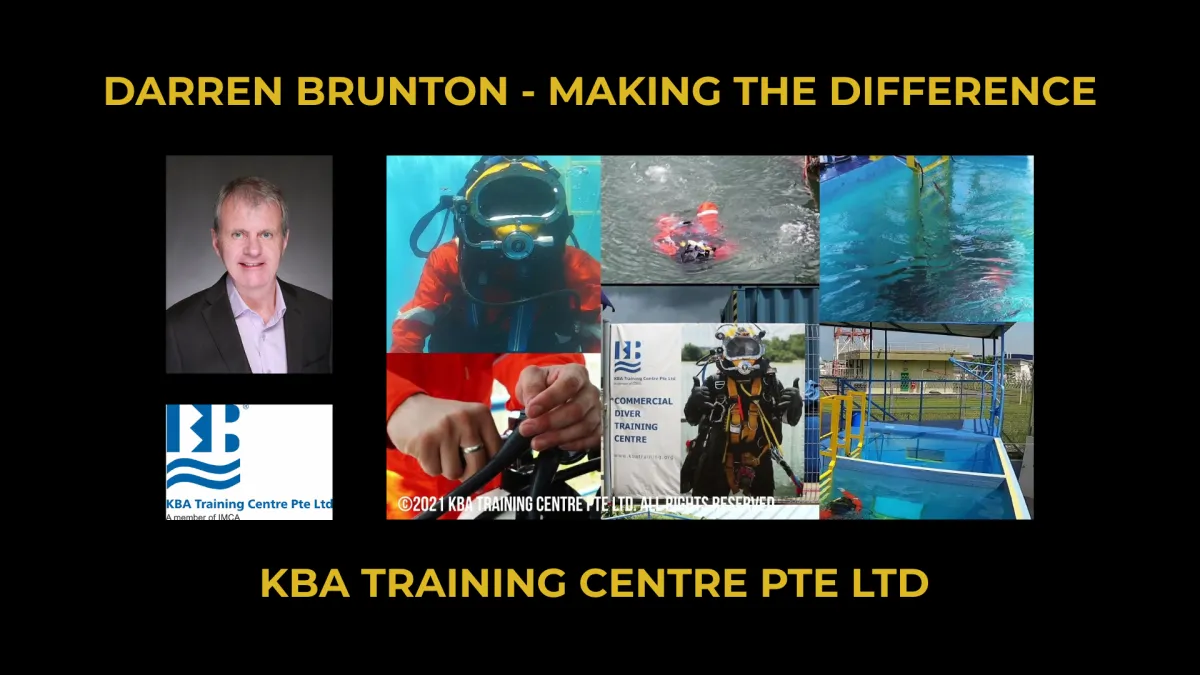
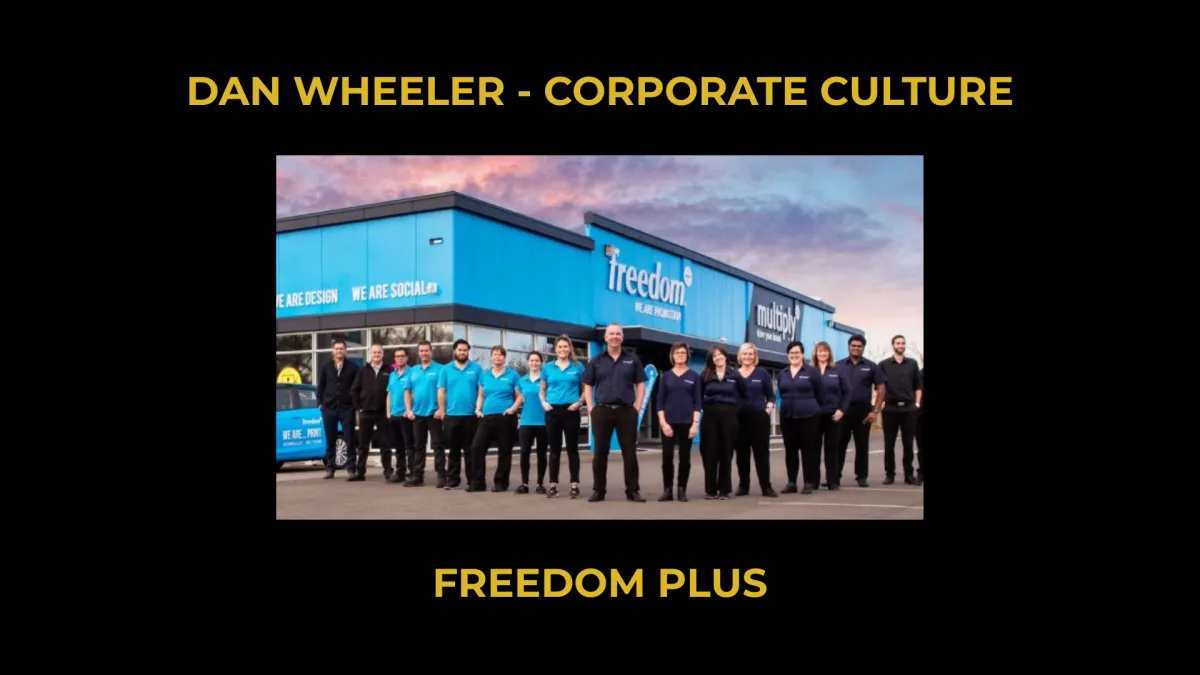

DAY ONE FREE TO THE PUBLIC!
MONDAY 16 JUNE 2025 - 5PM - 9PM
THE CONFERENCE CENTRE - MAIN STREET PALMERSTON NORTH
NEW ZEALAND
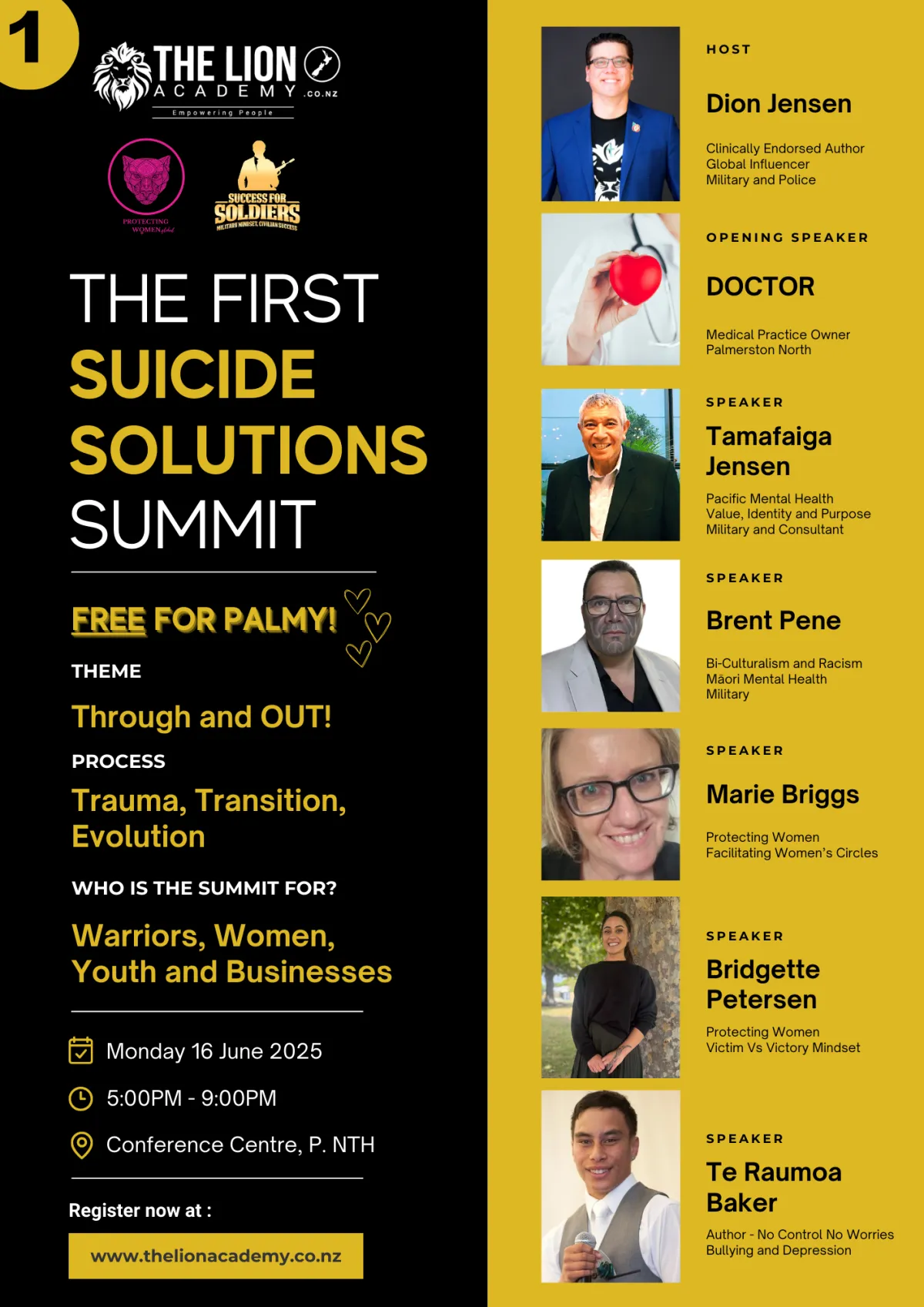
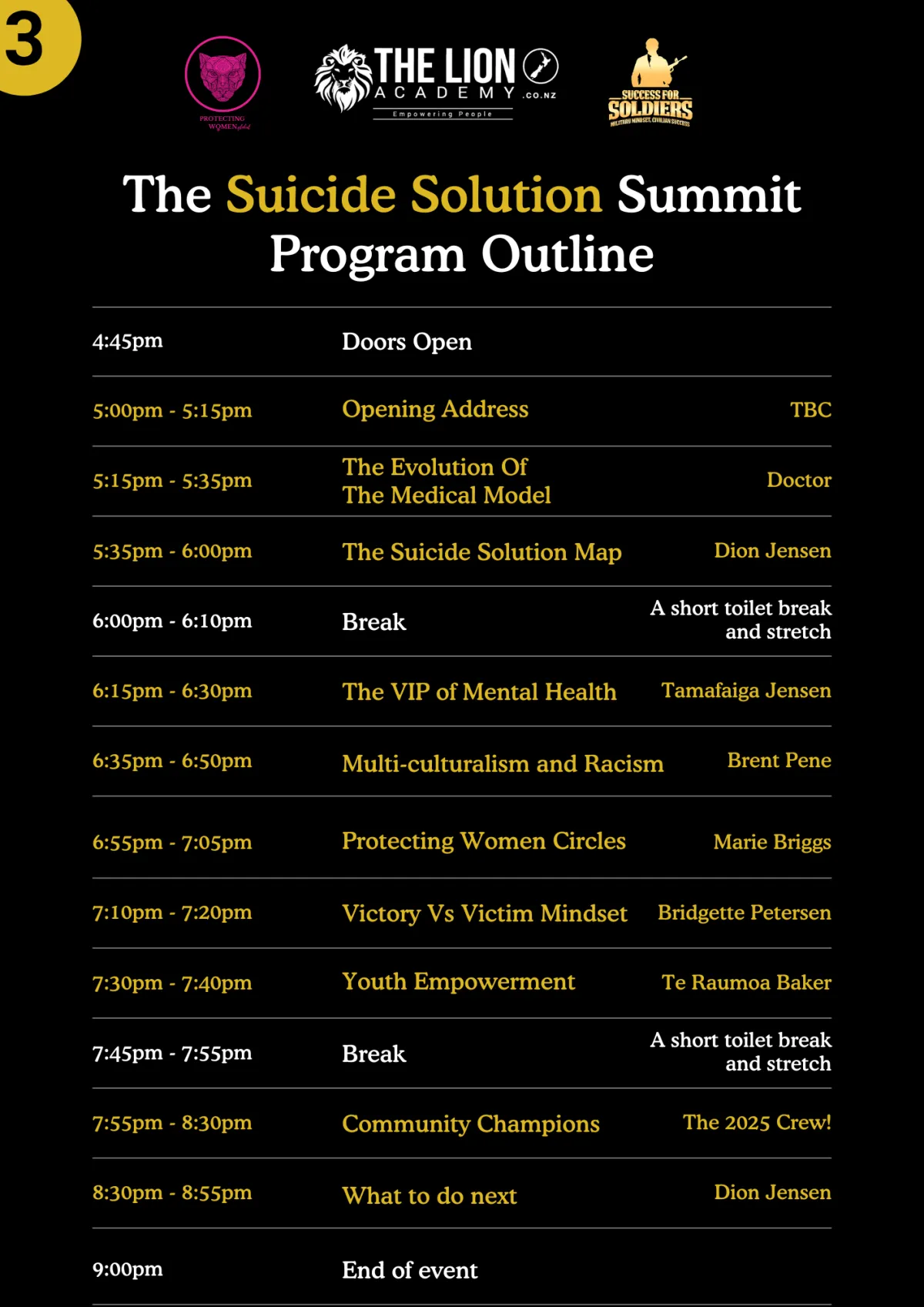
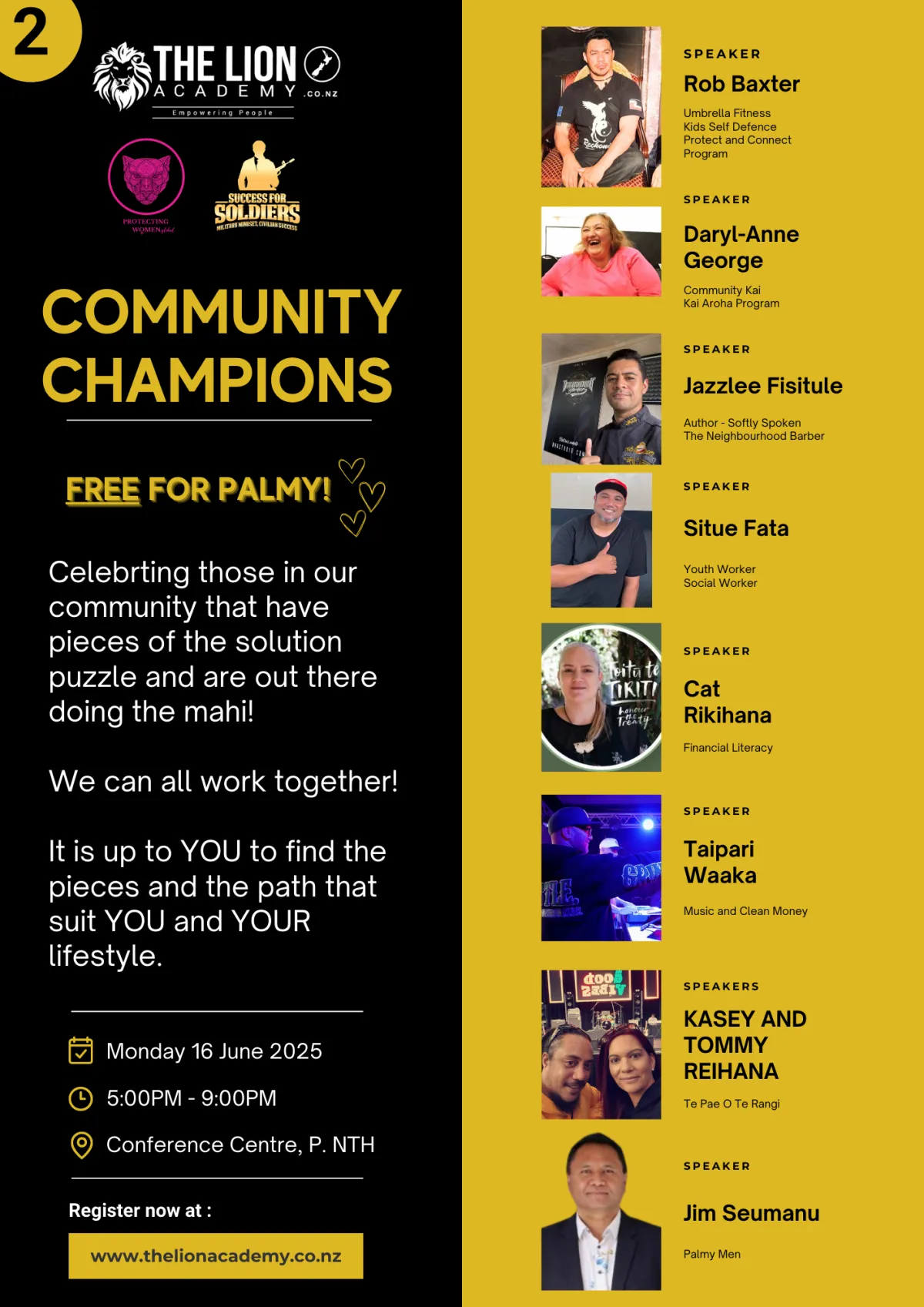
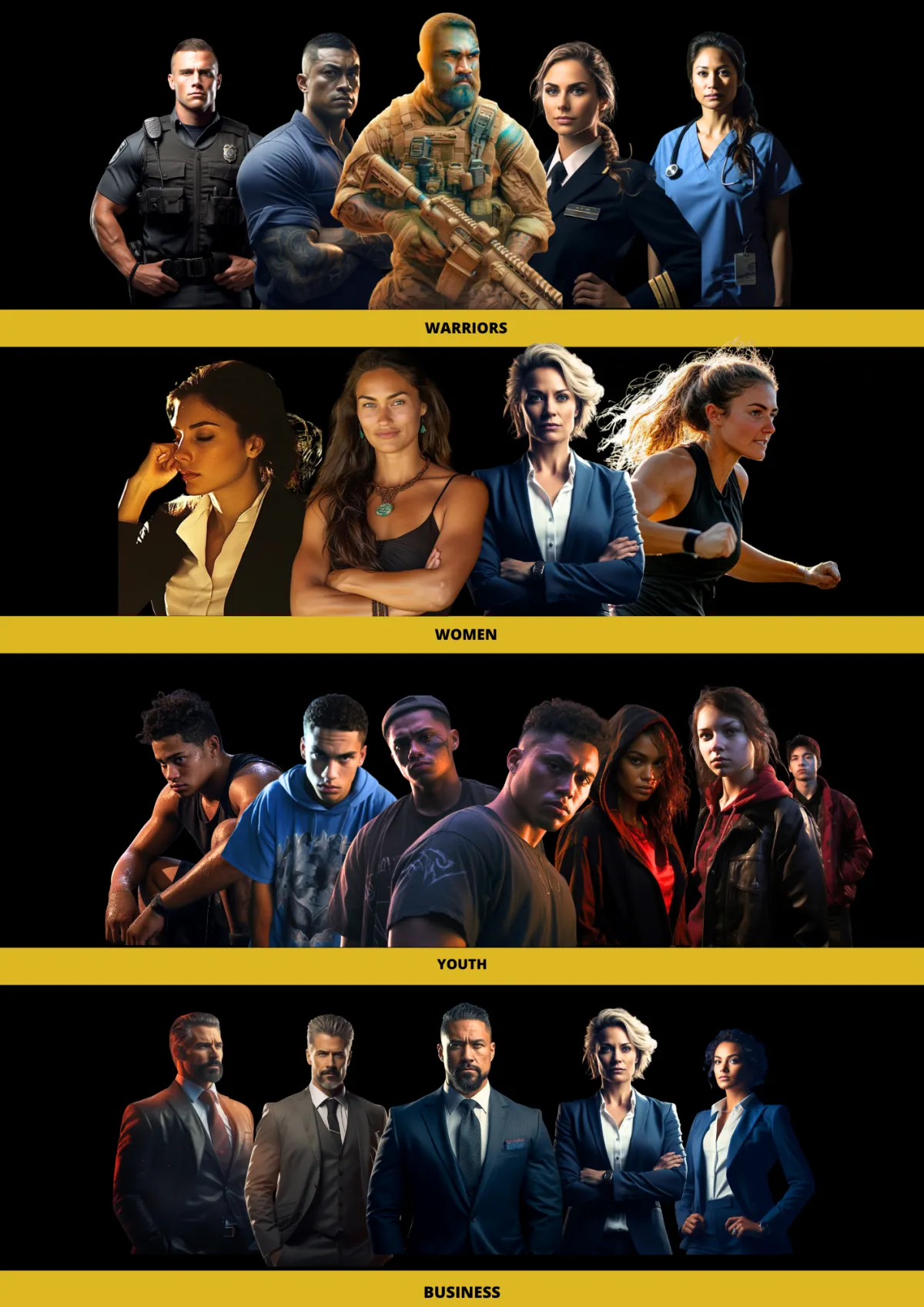
WARRIORS
WOMEN
YOUTH
BUSINESS
DAY TWO - PAID WORKSHOP FOR *PROFESSIONALS
TUESDAY 17 JUNE 2025 - 10AM - 4PM
THE CONFERENCE CENTRE - MAIN STREET - PALMERSTON NORTH
NEW ZEALAND
*Eligble for Professional Development (PD) with Certificate of Accomplishment
Available on AFTERPAY
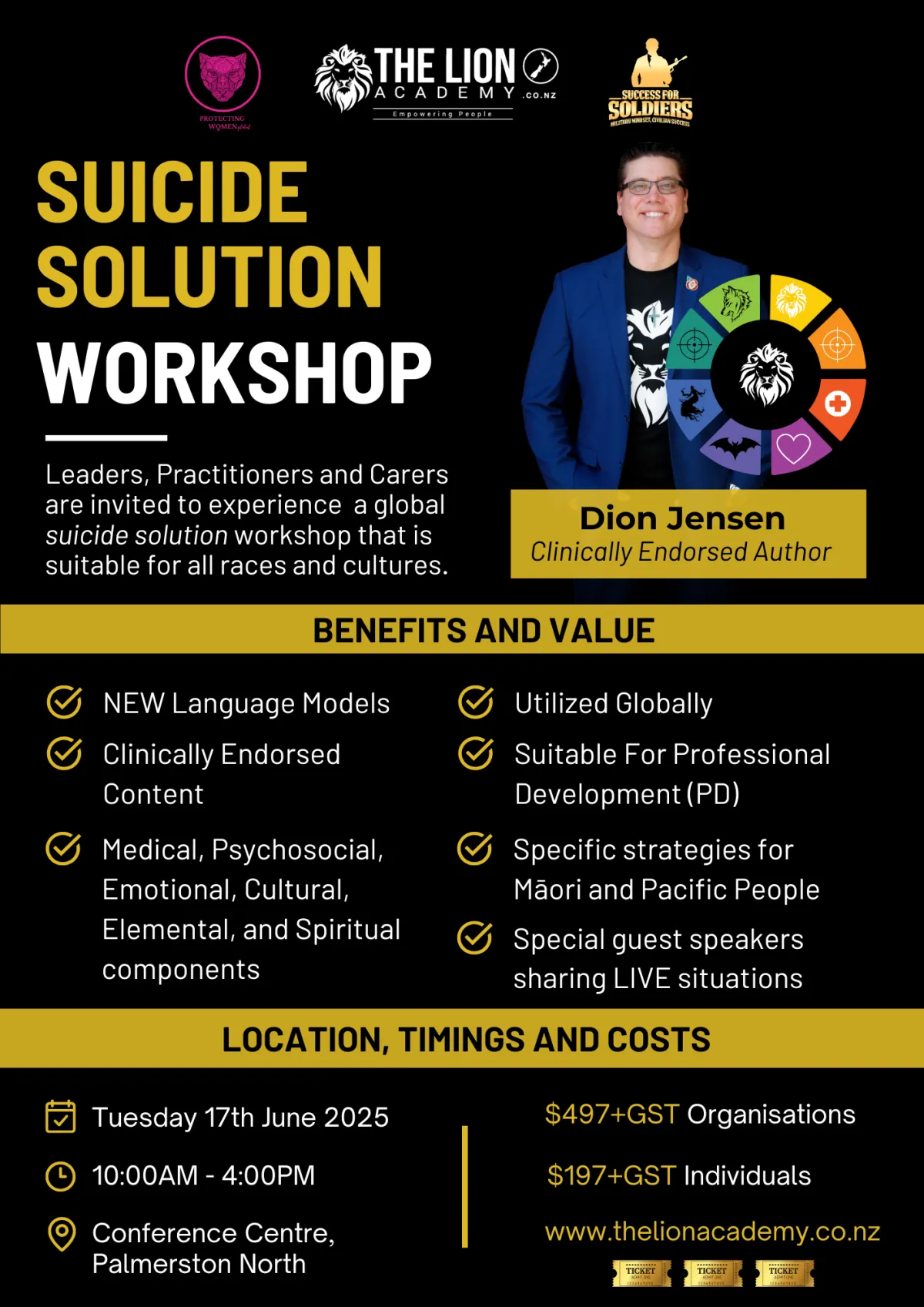
SUICIDE SOLUTIONS WORKSHOP
ORGANISATIONAL TICKET
20 ONLY
$497 + GST
Organisational tickets gain the opportunity to have Dion Jensen train their facilitators and trainers to deliver this workshop to their organisation or company.
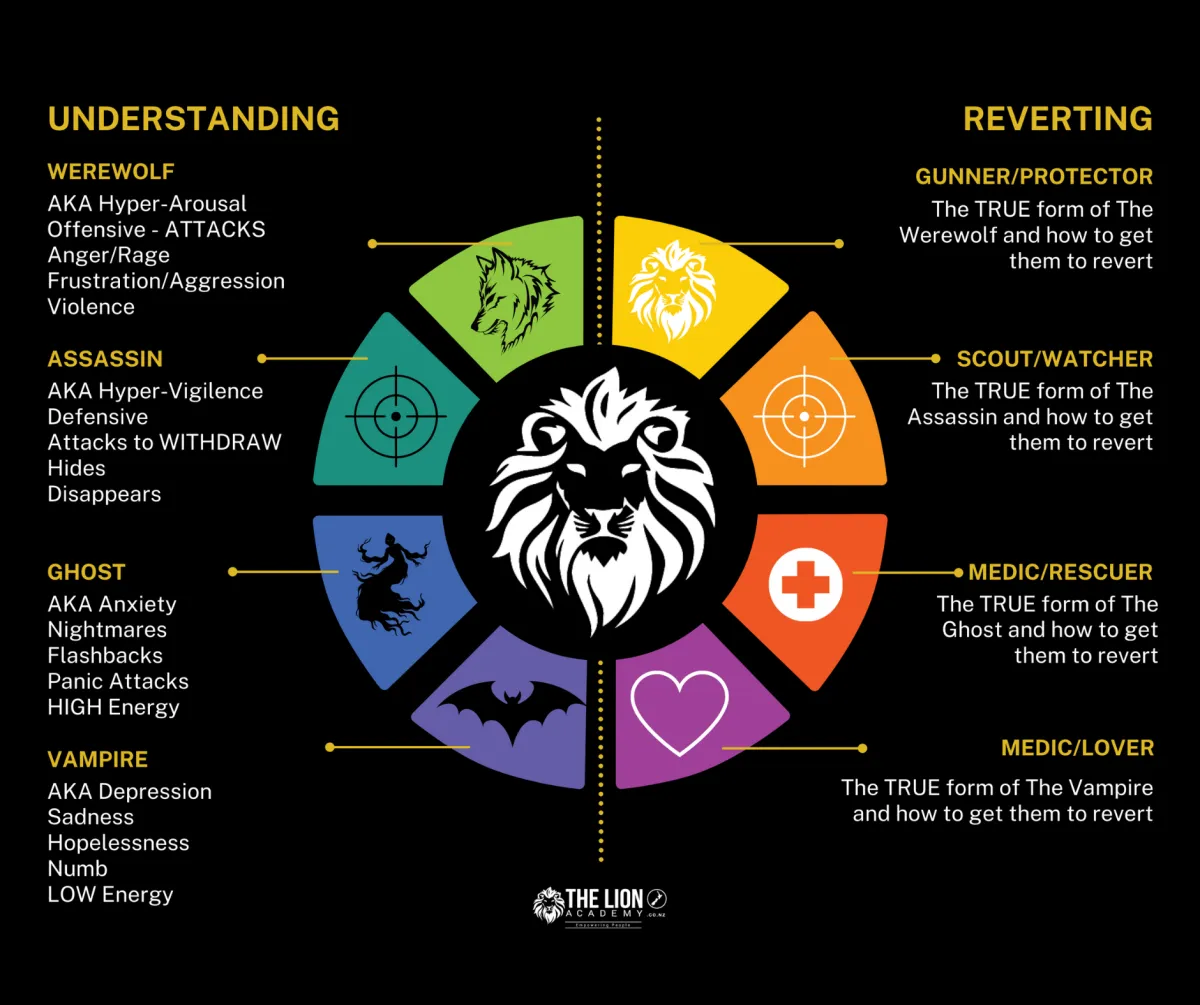
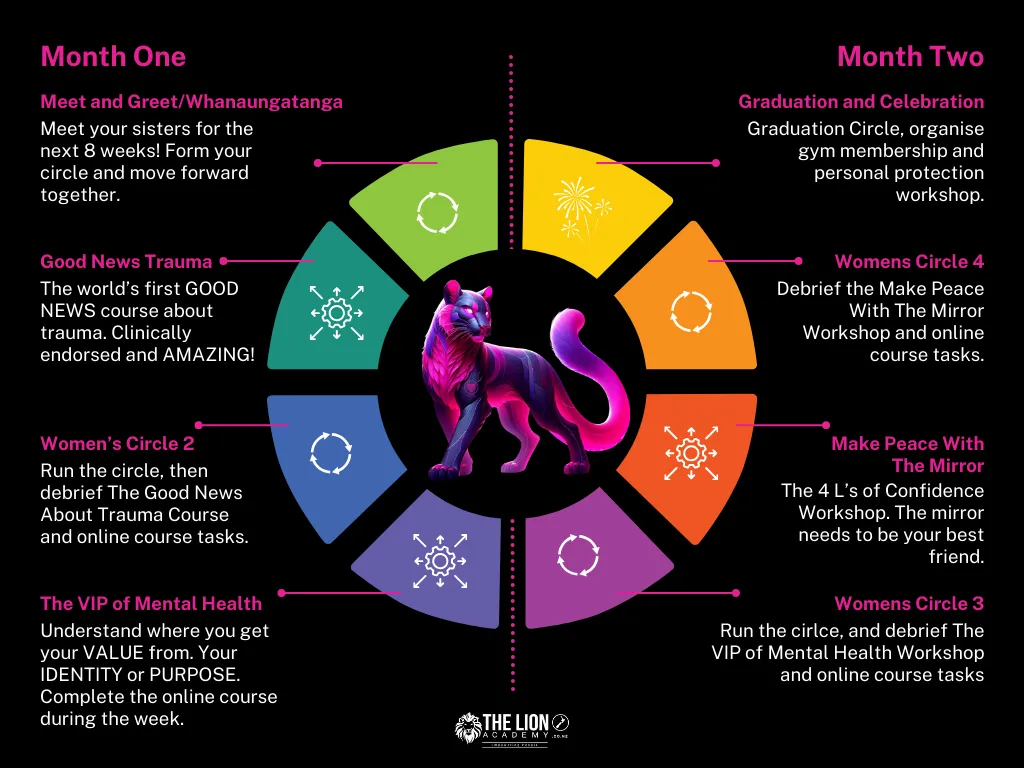
SUICIDE SOLUTIONS WORKSHOP
INDIVIDUAL TICKET
30 ONLY
$197 + GST
*Individual attendees be they counsellors, teachers, trainers or facilitators are eligble for a 60% discount to utilise towards their Professional Development budget.
COUNSELLORS
WRAP AROUND SERVICES
CULTURAL CONTEXT
LEADERSHIP ACCOUNTABILITY
WHY CHOOSE US?
We are the only organisation in the world with our own personal content, clinically endorsed through lived experience in the following demographics, available locally.
Although it is not available anywhere else, we link to any other solution provider that can help someone struggling, and we offer Train The Trainer programs for organisations to utilise our content.
Saving lives is not a competition. It's an obligation.
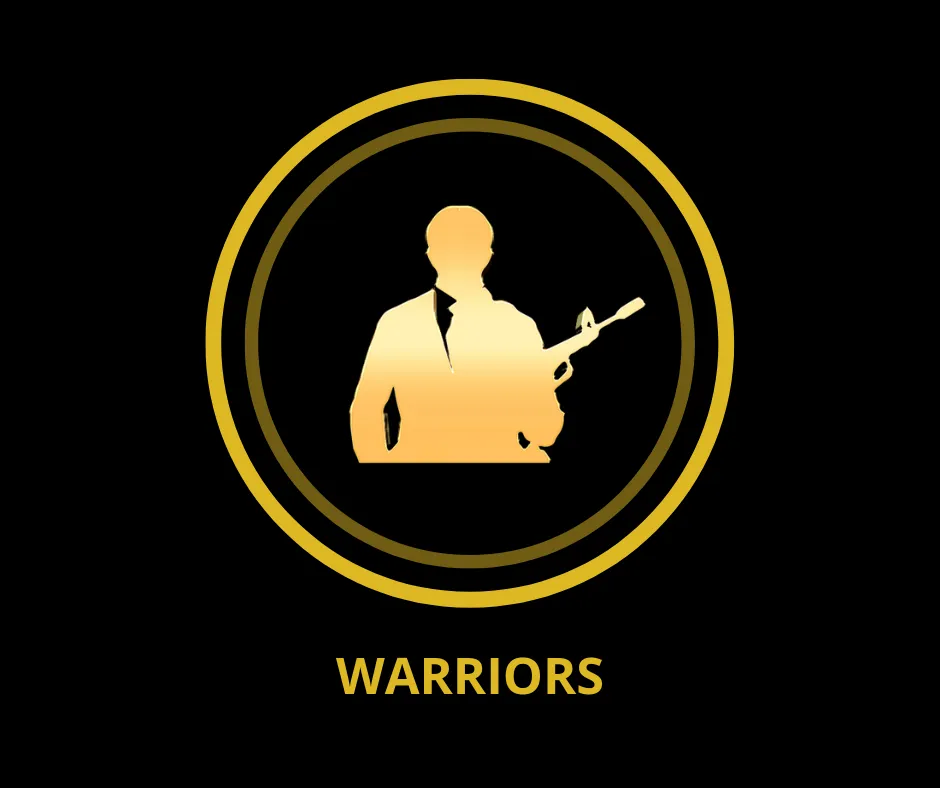
Military - Police - Emergency Services
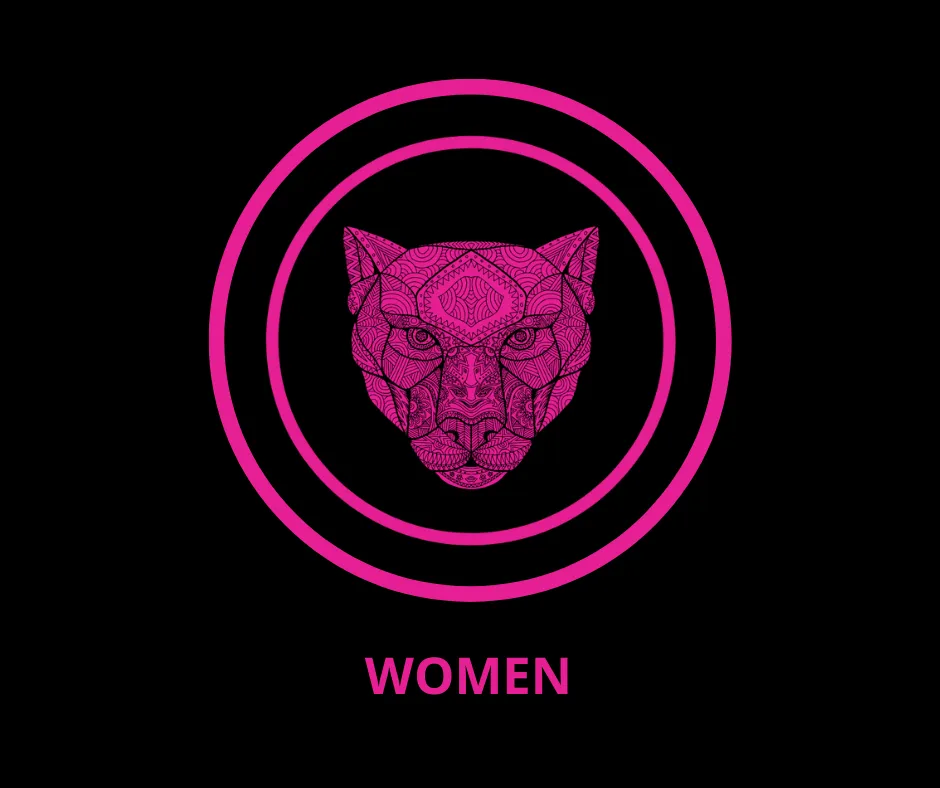
Teens - Adults - Mothers
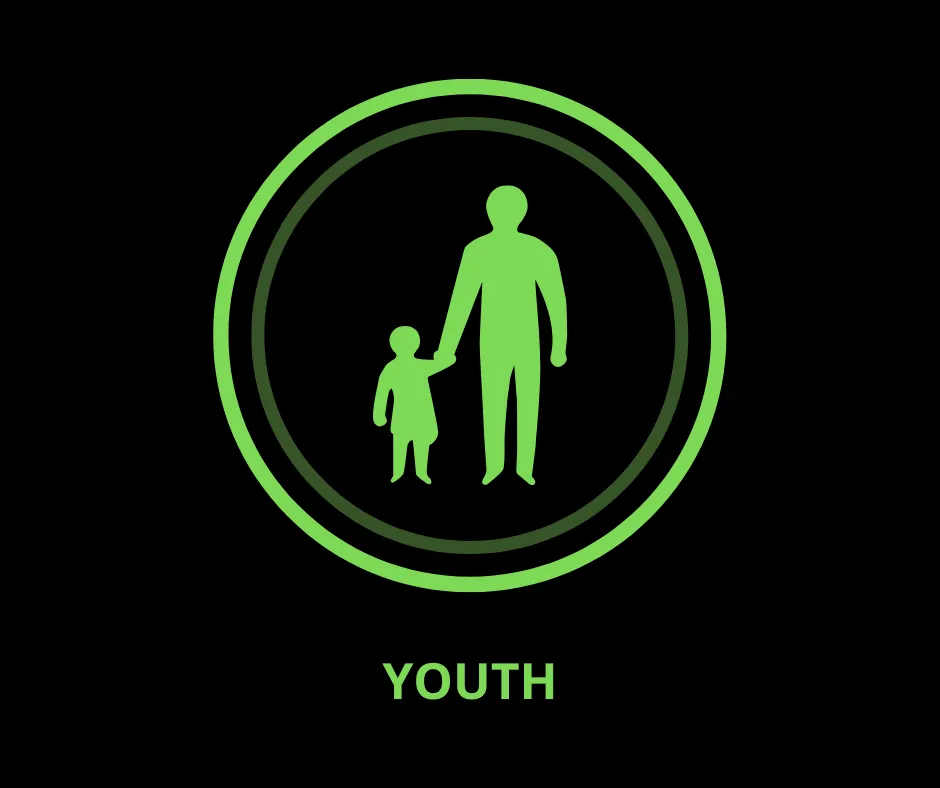
At Risk - Youth Justice - Lost
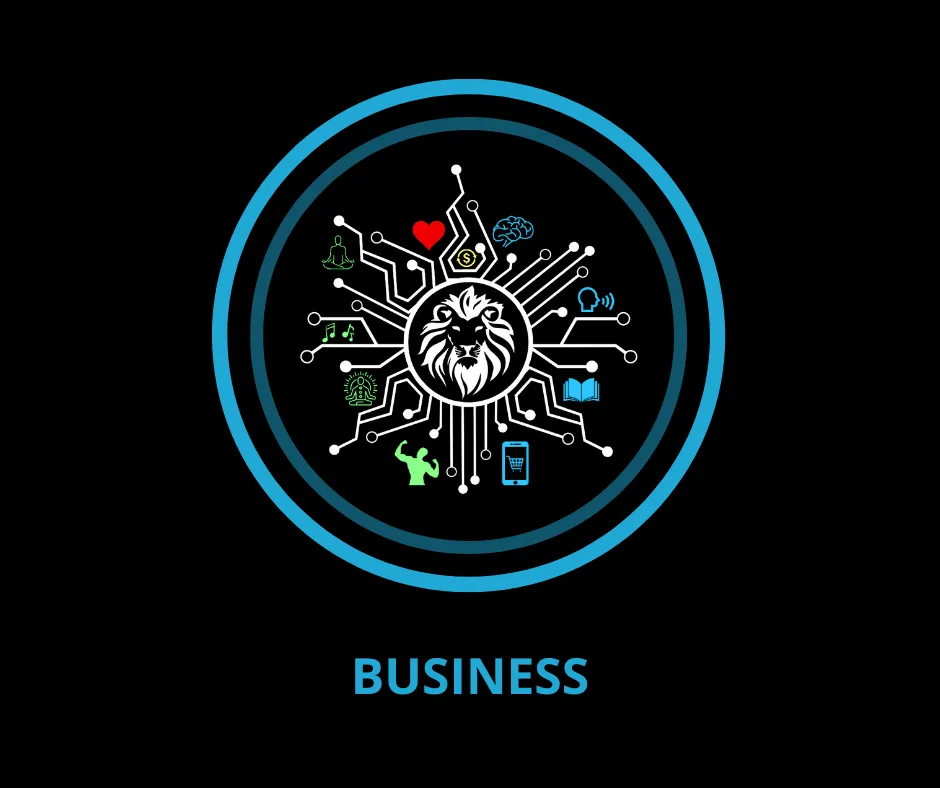
Employees - Team Leaders - CEO's
WARRIORS TESTIMONIES
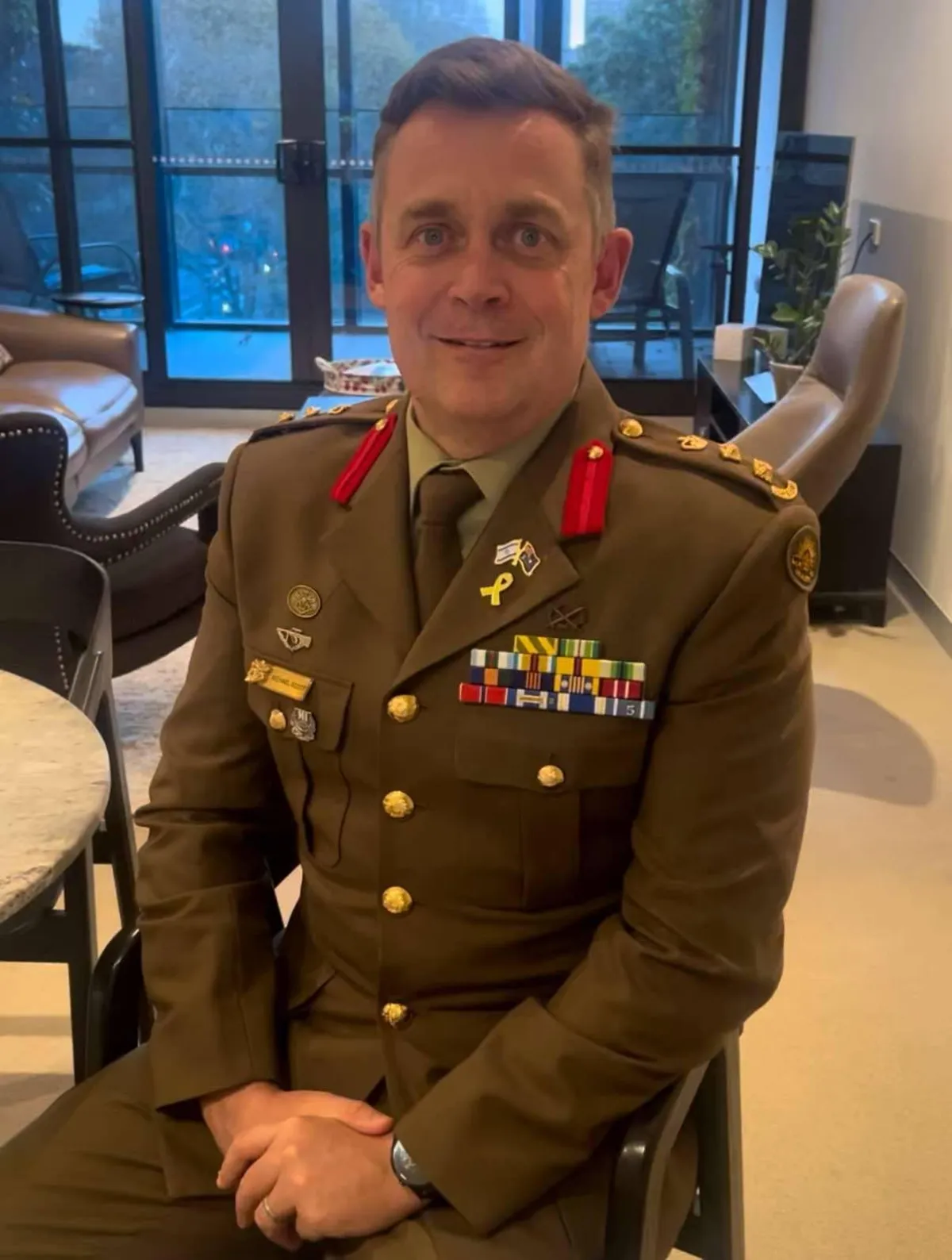
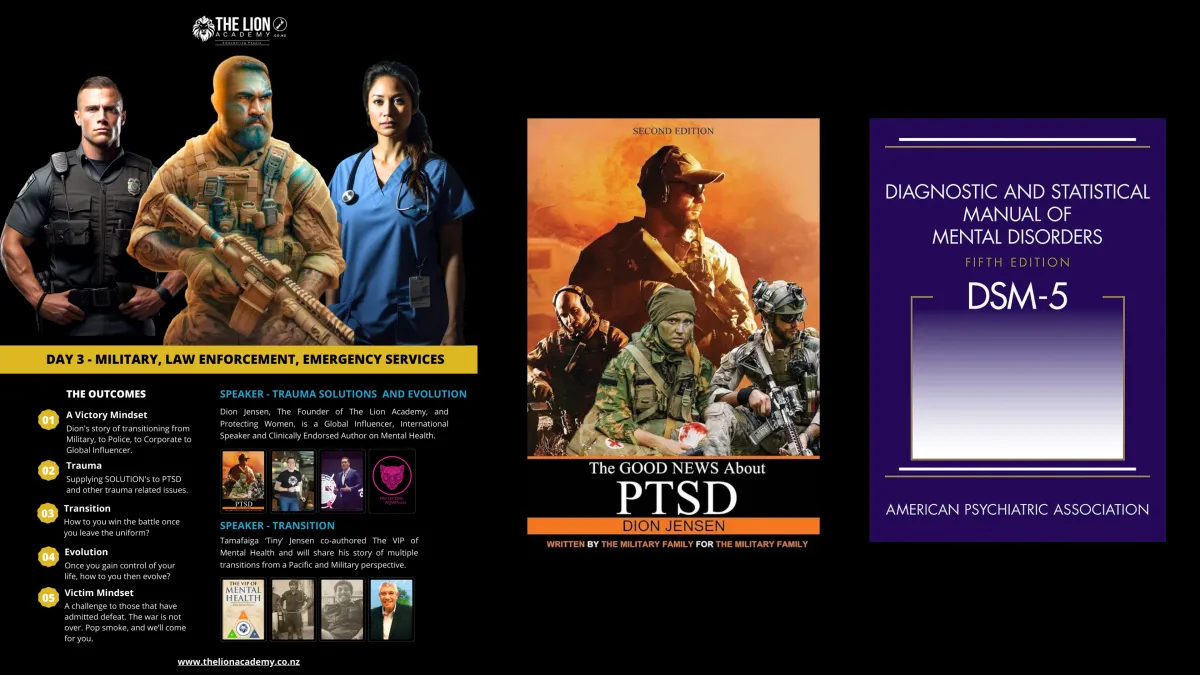
MILITARY COMMANDER
Shalom everyone. My name is Colonel Michael Scott. I served for over 31 years in the Australian Army, including deployments to East Timor, Bougainville, Iraq, Afghanistan, and the Levant.
In 2017, while working at the Warrant Officer and Non-Commissioned Officer Academy, I met Mr Dion Jensen—a former soldier and police officer with a rare gift for helping others regain their footing after military service. His work with Success for Soldiers struck a chord.
Dion’s work helps warriors. Alpha males. It helped me. It helps those who’ve led, those who’ve struggled, and those still finding their way. His approach isn’t about pity—it’s about purpose. About turning lived experience into strength. They say it takes pressure and time to create diamonds. In my judgment, it takes adversity to truly give context to achievement.
Sadly, our nations are losing too many souls at moments of personal vulnerability—at a time when, had they held on, they may have come to see their struggle as a test, not a terminus. A breaking point, yes—but also a point from which to rise. It is men like Dion who can make all the difference.
His methods are grounded in lived experience and have been clinically endorsed, offering practical solutions that speak directly to those who need them most. Beyond his organisational leadership, Dion is a compelling speaker and author.
The Good News About PTSD is recognised as the world’s first positive perspective on PTSD, reframing it as a catalyst for growth rather than a life sentence. Through his initiatives—including Success for Soldiers and Protecting Women Global—he has made significant strides in mental health advocacy, suicide solutions, and empowerment. Dion is a man of substance, humility, and moral courage. His work continues to save lives and restore purpose.
I brought Dion and a team member to Canungra to share their knowledge and wisdom with the next generation of leaders. It’s my judgment that Dion’s work has saved lives—and has the potential to save many more.
I endorse Dion and everything he stands for.
MILITARY VETERAN
"Dear Sir/Mam, ladies and gentlemen.
My aim is for whomever is reading this is to understand how close I came to ending my life and what saved me and why.
I am hoping that this information will stop someone else from killing themselves: I went to hospital, spoke with both psychologists and psychiatrists, however this did not help me one bit, they didn't speak my language, I didn't trust them and if anything (like previously) made me want to avoid them at all costs.
Itwasn't until a stranger turned up one day, this stranger would be the man that would save my life, and he would give my 3 beautiful children their father back and a loving son to his parents.
This man was Dion Jensen.
Not only did he freely give me guidance and his book (The good news about PTSD ) he took the time to sit down and explain to my mother and extended family about my situation.
He spoke English and spoke in such a way that we could understand (our language) not the language of a psychiatrist that you almost need a degree in robotics to comprehend.
Let me be totally honest, what he told me, the language he spoke and the direction he pointed me in, saved my life and that's the truth of it."
Chris
Military Veteran, Soldier, Son, Father
AUSTRALIA
" This book will echo for decades to come."
"Coming back from an operational deployment then the nothingness until PTSD and major depression kicks in.
After 11 years of hardly any help and no programs or enough veterans other than Vietnam veterans; help wasn’t out there.
I want this book or should I say I NEED this book. It’s written in military lingo and is completely understandable.
This book will echo for decades to come."
- Retired Military Veteran
"There is only a new skill to put in my sack."
"Not being of a military background, but one of Policing I can relate to what you have written, and it is great.
I have suffered from PTSD for a long time due to various critical incidents (murders) involving children and young people along with fatal crashes death messages, sieges, riots and a myriad of incidents over 21 years.
Reading what you have written has opened up an escape for me from where I have been locked in at times.
Thanks mate. It has been a battle..."
- NZ Police Officer
"I am normal.
My normal."
"No-one had ever explained to me why I would become very angry and think that everyone was my enemy or why I would wake up screaming at night in pools of sweat and tears.
They could tell me what it meant in medical terms, (I have been diagnosed with depression, anxiety and PTSD) , but no-one could explain to me why or how I ended up this way ... until now.
Dion's book, even just by reading the book outline, has already connected my subconscious section to my brain and has already helped me understand that I am not "crazy", that I am normal, my normal."
- Australian Military Veteran
WOMEN'S TESTIMONIES
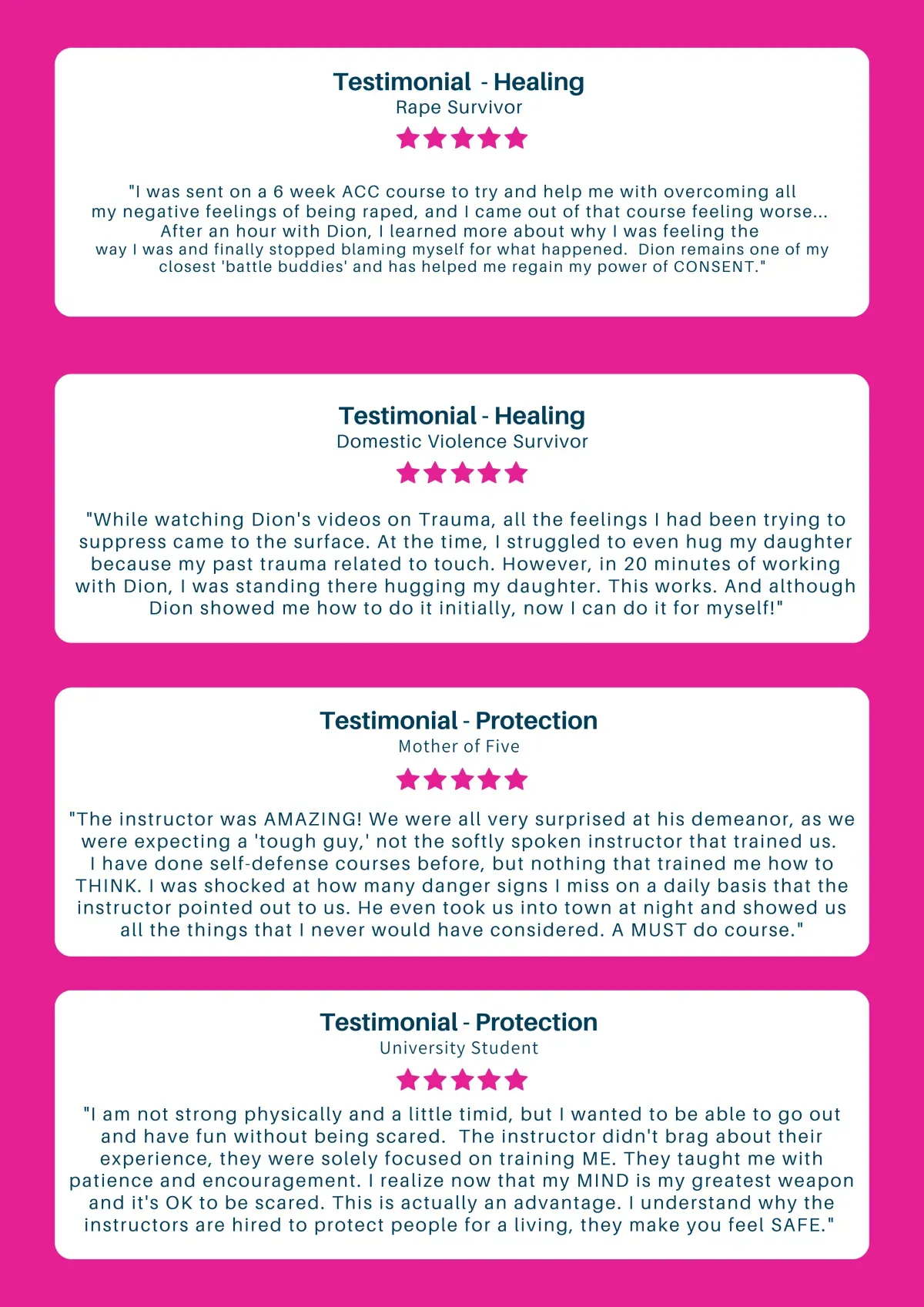
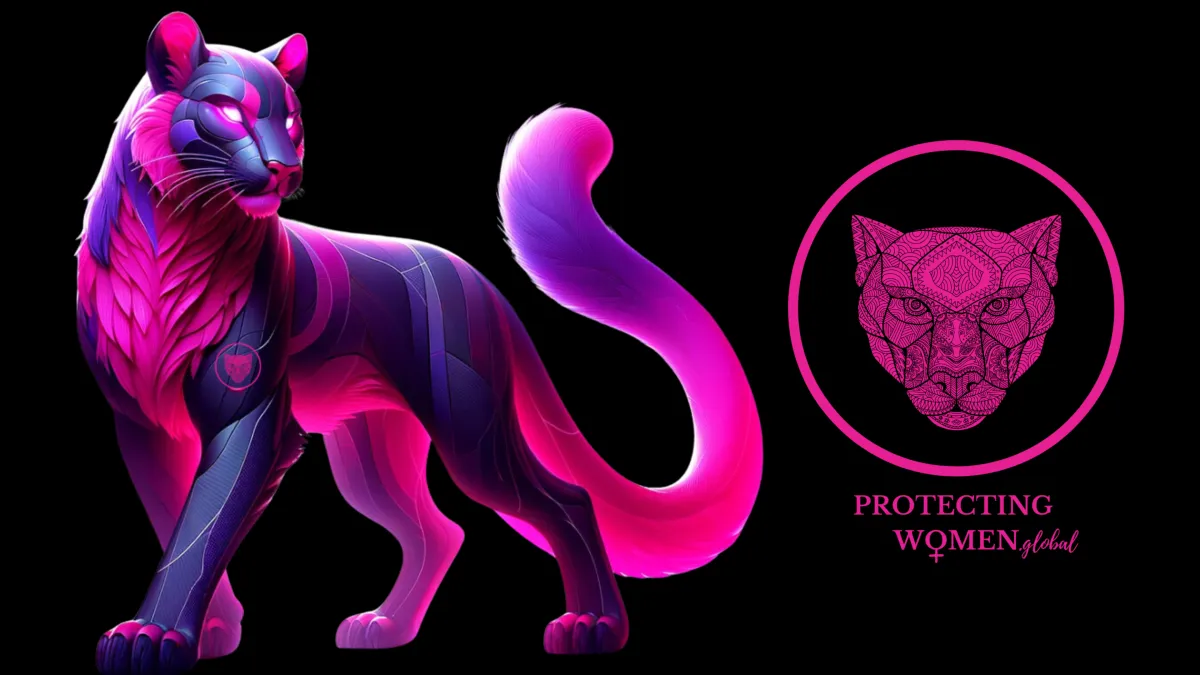
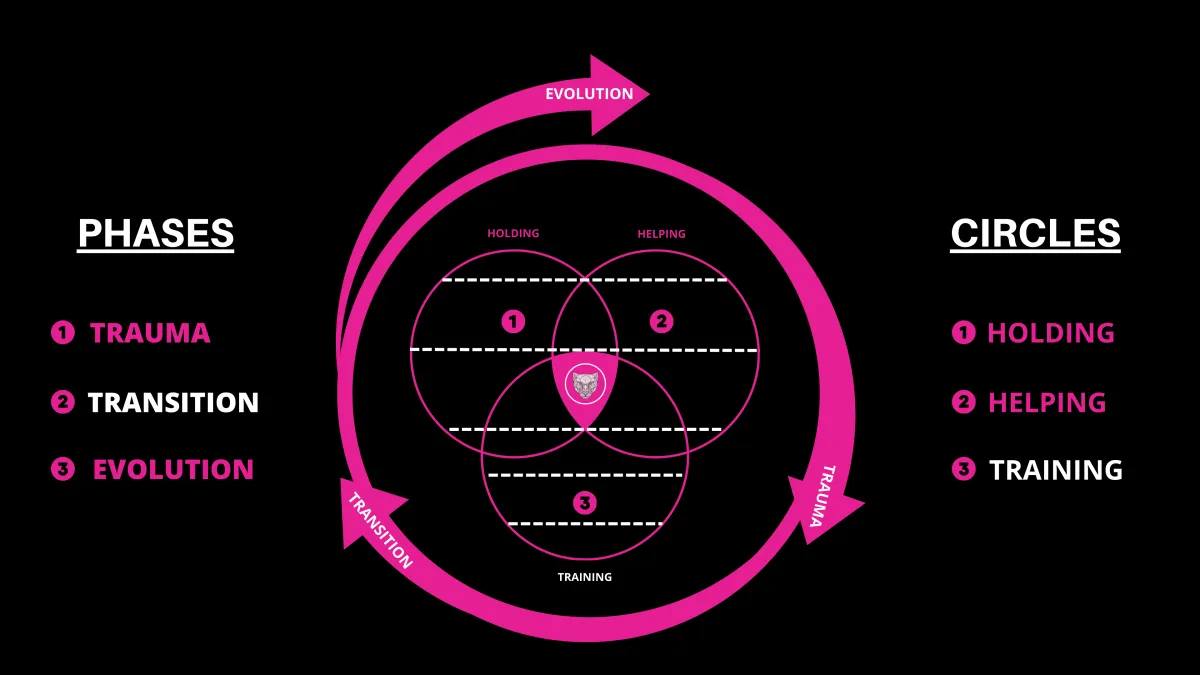
RISE AND ROAR - THE PROTECTING WOMEN THEME SONG
YOUTH TESTIMONY
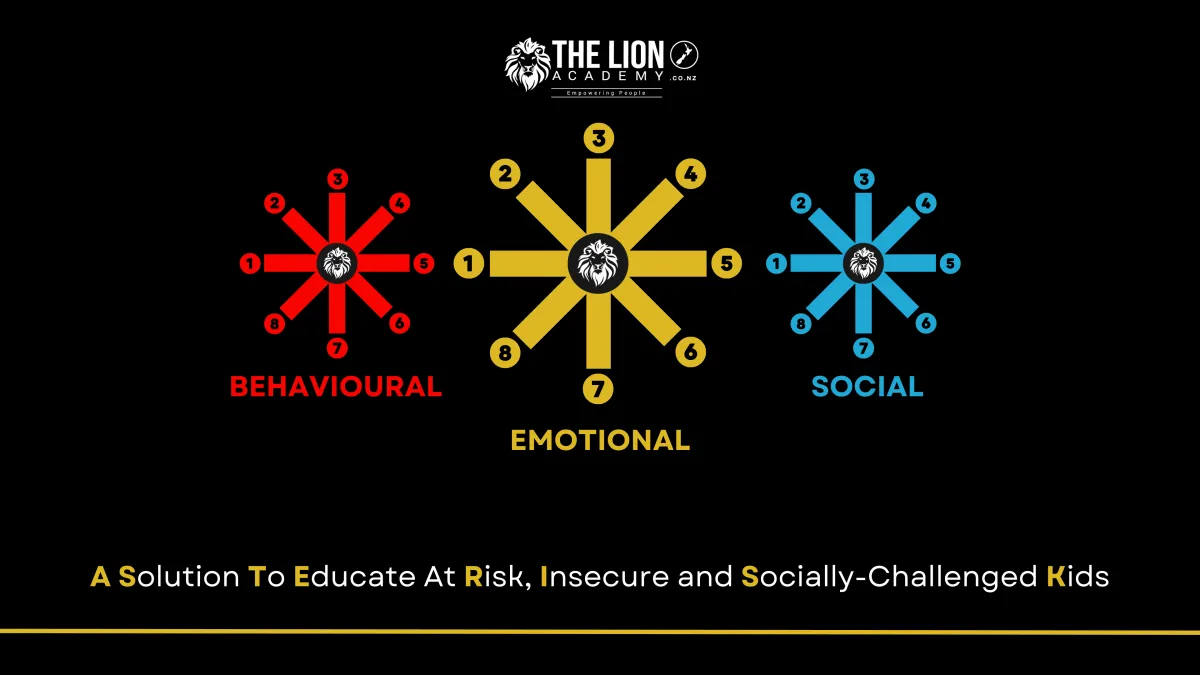
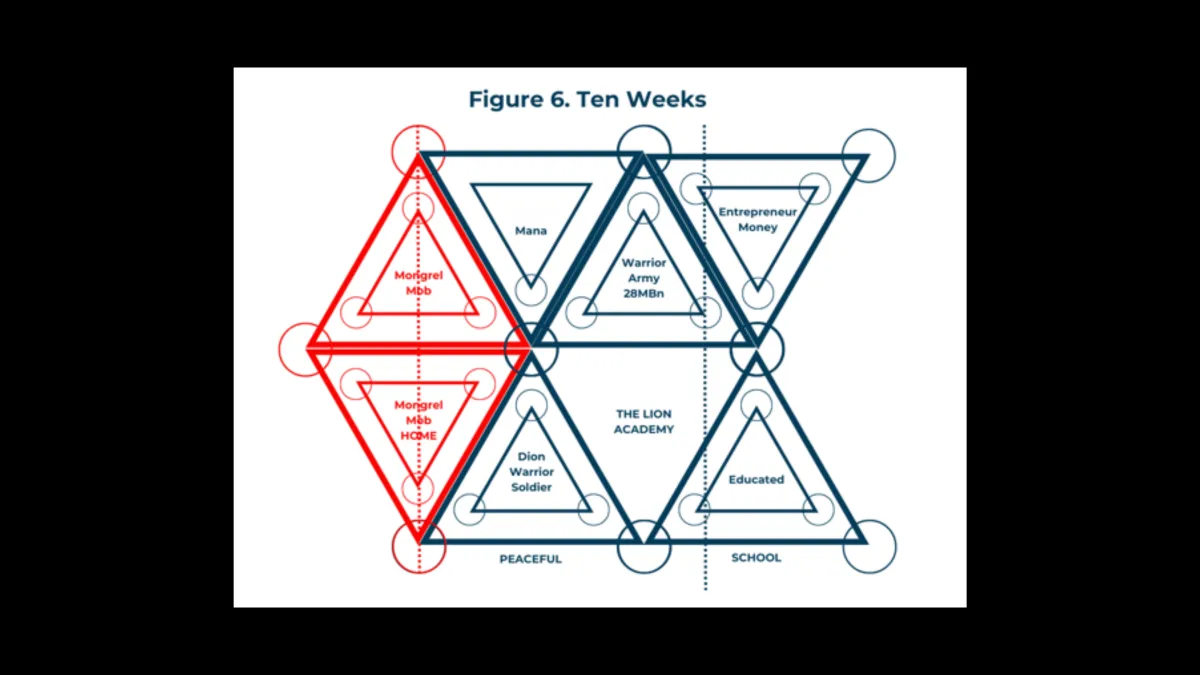

"Dion always has a plan and a map. Our tamariki can always see where they are and where they could go."
Being a lawyer for children for over 20 years, I work between the 'At Risk' and 'Youth Justice' children, with the courts, Oranga Tamariki, MSD and multiple community groups.
From those children that have suffered extreme physical, sexual and physical abuse, to those children who then get into trouble with the law.
Dion connects immediately with these children, in my opinion, for three reasons that consistently stand out.
Firstly, he is a warrior. These kids don't scare Dion one bit, and they know this. Interestingly, this makes the children feel safe. They don't have to project aggression to keep themselves safe, they know Dion is strong enough to protect them from what they fear.
Secondly, because Dion has been through his own trauma, his own PTSD and shares his story of how he found his way out, with the kids in their own language.
And thirdly, because Dion always has a plan and a map.
Our tamariki can always see where they are and where they could go. Dion co-designs these plans with the children so they have control and input into them. In Māori culture, we call this Mana Motuhake. Self-governance.
But one story stands out in my mind. It still amazes me.
One of the children that we asked Dion to work with, was becoming more and more agressive on the street, assaulting people and trying to be a gangster.
When I arrived at The Lion Academy, I was shocked to find this child, this supposed dangerous child, asleep on the couch in the training room while Dion was working on his laptop.
He felt safe enough to fall asleep because Dion was there. On their first day! Our tamariki know instantly if someone can be trusted.
Dion treats these children like gold, and they in turn start to feel valuable. Dion underpins his strategy with programs and content that he designed personally and are clinically endorsed.
Those of us in the field know that what Dion does works. But sadly, due to budgets and politics, not every child can get access to what Dion provides.
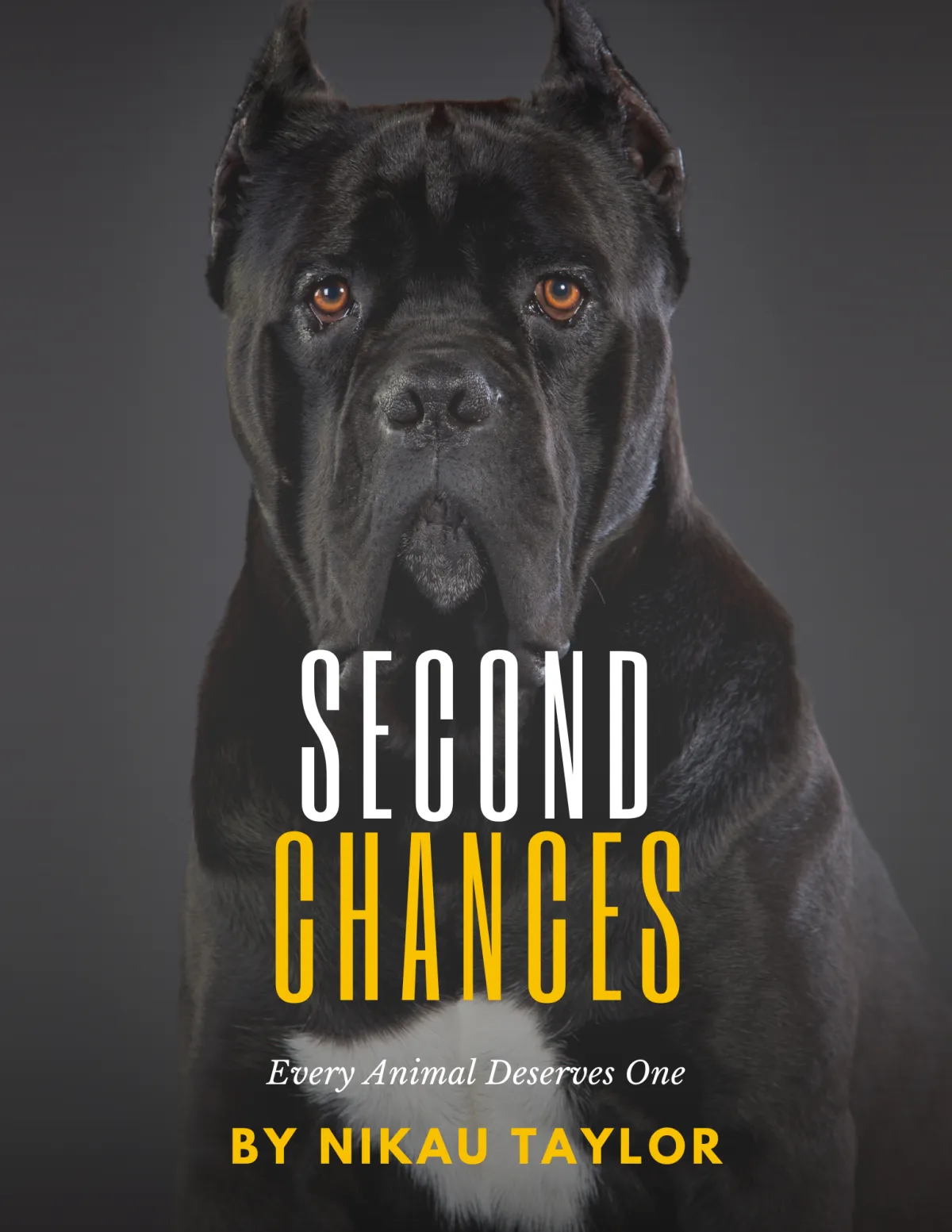
"Never underestimate the spirit of a kiwi kid. They are more adaptable, intelligent and caring that we give them credit for."
Imagine standing in youth court in Palmerston North watching history being made. A youth court judge is reading the introduction to the book on the left: Second Chances
The young man standing in court, is the author.
The judge puts the intro down and looks at this kid amazed. Because this kid can write!
Not only that, it gives a deep insight to the heart of this young man. This young man who crew up in foster care, always finding a way to get back to his mum, that would only trust animals because they never hurt him.
NEVER underestimate the spirit of a kiwi kid. They are more adaptable, intelligent and caring that we give them credit for.
And it is my absolute pleasure to know this young man.
Click the button below to read his book intro.
BUSINESS TESTIMONIES
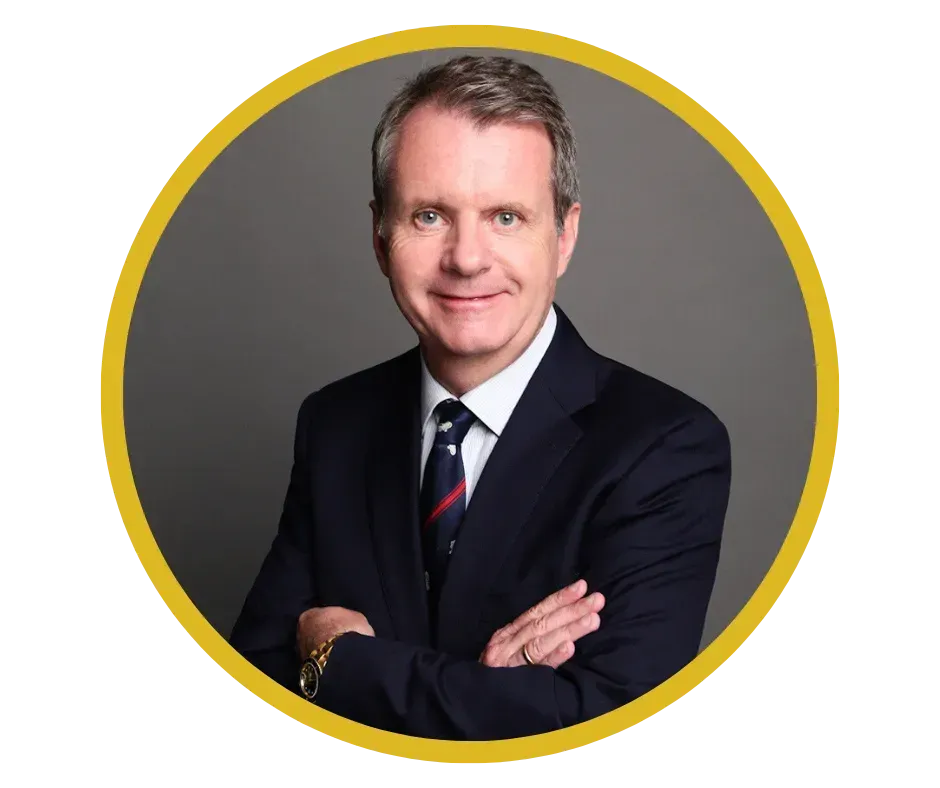
"A wealth of experience"
Dion is a special individual, with a wealth of experience in 'life areas'
only a few would have been exposed to.
Dion presented a half-day workshop for my company on leadership and conflict management and he brought all his skill sets to the session and managed to bring a group of very experienced individuals back to
reality.
He used the full range of his experiences to relate to some serious scenarios in discussion.
I would strongly recommend Dion to any organisation or individual for coaching, training or speaking.
He is able to communicate in a clear decisive manner, with authority but with passion and a friendly heart.
Darren Brunton CFIOSH
Managing Director
KBA Group of Companies

"Mind-blowing personal experience"
Dion the Lion!With the ferocious steel mental mindset but yet the majestic bighearted lion!
It is rare to find a trainer who had been
there done that - living on the edge of life or death on a daily basis due to
your past job nature.
This ex-military experience was already an eye opener to how strong a mindset Dion portrays to us. His confidence and ability to manage fear makes us look at ours in perspective.
Mind-blowing personal experience
coupled with his global sales experience brought us an intensive 8 hours of training helping us to shift our paradigm and mental states!
I highly recommend Dion if you are seeking a trainer who speaks from his heart, mind and soul!
Jaslyn Ng
Award Winning Financial Consultant
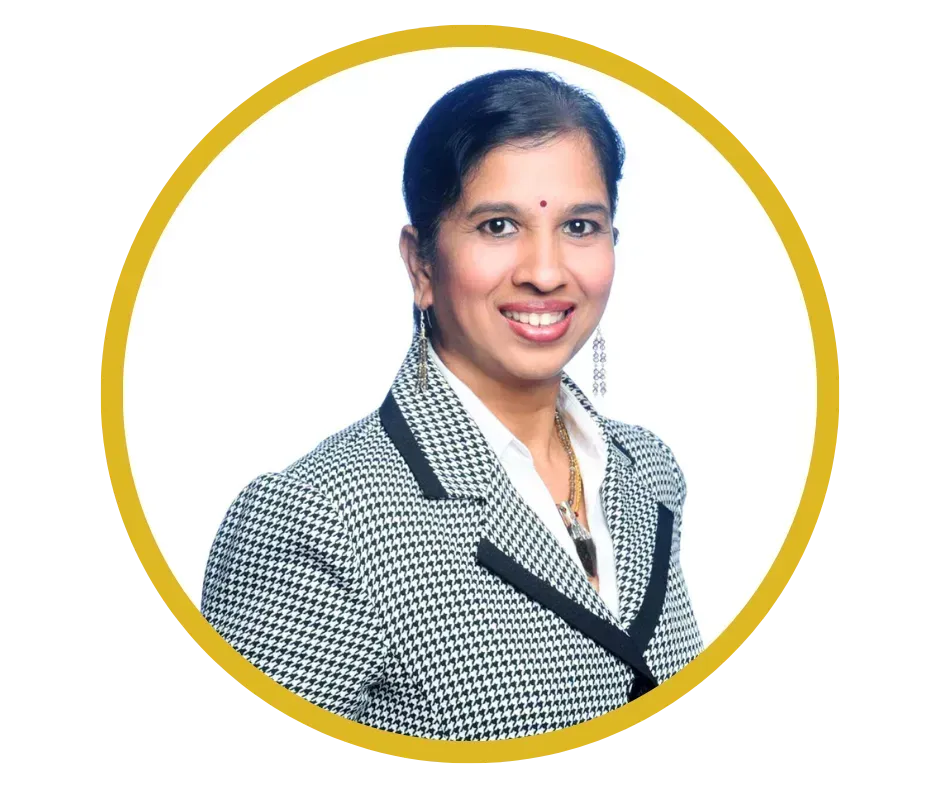
"His delivery skills are absolutely stunning!"
I attended Dion’s Coaching Session. His delivery skills are absolutely stunning!
You can feel that the delivery is not just verbal but it is from his heart, mind and soul. It is genuinely coming from his life experiences. Full of energy.
His skills set is so diverse. Starting from leadership, team building, networking, change management to motivational speaking to name a few.
I was fortunate to experience a few of his wide repertoire of skills.
He makes each participant feel important and engaged in the session.
It makes you want to attend more and more of his sessions.
Great personality!
Vyjayanthi Devanathan
Senior Financial Consultant
CLINICAL ENDORSEMENTS
Clinical Psychologist
In his book, Your Subconscious Bodyguards: The Good News about PTSD, Dion Jensen writes about PTSD from the position of a soldier to others in the defence force or police service.
This is an essential topic for people in such services, as PTSD has a higher level of occurrence in these professions compared to many others. In other words, for some (up to 12%), PTSD can become an occupational reality for those serving their country through combat. Written by a soldier for a soldier, Dion is able to reach those from within the military world, effectively applying the highly skilled training they already possess to master the complex issue of PTSD.
The straight and specific language of this book aims at reaching those that understand this world of emergency rendezvous (ERV), section commander, threat assessment, and contact drills to mention only a very few examples.
Dion refuses any victim position, and so applies a sense of mastery, so important for soldiers and police, and as we know, so central in working through PTSD. This is essentially empowering, and that is why in the mental health tradition, the ‘expert experiencer’ is so successful, and why they reach people in pain more effectively. They have been there, survived it, and found a way through it.
The ‘expert experiencer’ has been fully accepted in many areas of mental health, for example in the substance abuse area in the form of Alcoholics Anonymous (AA), or in the area of psychosis, as with intervoice for voice hearers. Dion rightly highlights that soldiers do not find access to mental health services simple or easy for many valid external and internal reasons. Therefore Dion speaks within a long and important tradition in mental health as an ‘expert experiencer’, in this case with the voice of the soldier and warrior 271 Dion Jensen in regards to PTSD.
People who have moved through their own struggles and support others in theirs is an essential part in the varied landscape of mental health interventions. For those that are struggling with PTSD both in the military and in the police service, this book gives you an opportunity to listen to somebody who knows your world, has been where you have been, and applies the very skills you already possess to achieve your goals. To have been in the military and in the police service is in itself worthy, to overcome PTSD will take all your soldiering skills.
It is the path of the warrior to master our own self.
For the professionals and organizations, here are some considerations: As an ‘expert experiencer’, Dion with the language of the soldier and warrior has made PTSD his own. However, more than that, he has also spoken to other experts, a couple of therapists for example, to responsibly access relevant information.
Having myself worked extensively with severe PTSD in many clinical settings, as well as worked with soldiers, this book both empowers and is thoughtful.
The book does not merely share his own story, but more than that, he applies the technique of soldier imagery and warrior archetypes to access more complex and richer emotional material in regards to PTSD. This approach is then enhanced with emotion regulation skills.
It is well documented that safety, mindful desensitization, affect regulation, a sense of mastery and meaning within a supportive environment are central in working through PTSD. All of that is to be found in this book, just translated so that it makes sense to soldiers or warriors.
Like all ‘expert experiencers’, Dion states very clearly that he is not a clinician, but there is no doubt that his story and his way of overcoming PTSD provides a means for others to find their warrior way to a new life.
Ingo Lambrecht
PhD M.A. (Comp. Lit.) M.A. (Clin. Psych.) Wits SA
NEW ZEALAND
Clincial Psychologist - Daughter of a U.S. Marine
Personally, I was born on a military base and have a family full of former and currently serving military personnel. My father, a former Marine, served on two tours of Vietnam. My exposure to PTSD as a result of military service began at a young age. Professionally, as a psychologist, I have worked with children, adults, men and women that have suffered from military and non-military related PTSD.
Until I read your book, I believed I had a good understanding of the relationship between military life and PTSD onset and recovery. I was wrong. Thank you for relieving me of my ignorance.
For me, your book provides me with a clinical tool in two ways. Firstly, your personal journey highlights the effects the military experience has on the human condition in general. The cognitive and behavioural training used to train the combat soldier is very effective and necessary for the survival of the individual and the team.
Unfortunately, it is so effective that it does not just go away after time (extinguish), it requires as much effort to train the brain to be a civilian again as it did to become a combat soldier. For those who experience PTSD the symptoms interrupt the brain's civilian training.
Your book describes the residual effects of combat training on the returned soldier in a way that everyone (i.e. soldier, wives, clinician, doctor, police, correctional officer etc.) can understand. Just handing your book to a client suffering from PTSD helps them to normalize their experience. Those that support others suffering from PTSD gain crucial insight into the dynamics that create the suffering, the daily battles being fought, and why the mind needs more help to come home sometimes than the body does.
Secondly, your book is like an interpreter. The concepts, and language used to describe those concepts, provide a unique and easy to understand point of reference during therapy. One of the difficulties in therapy is language between the clinician and the client. At the start of your book I found the language challenging. In the end, I understood every word. In addition, the concept of the positive and negative characteristics of the same personality trait has provided me with an initial mutual platform for insight, and further has assisted in the development of the therapeutic plan.
The possible uses of your concepts in clinical application are exciting and I cannot wait to read reviews from clinicians as they apply them. I will be recommending your book to not only clinicians, but to any person that seeks to enlighten themselves as to this debilitating disorder.
As for clinicians working with returned soldiers, I am sure once they read even as far as the first two chapters they will understand how much this book can enhance their practices. All the best in the future and thank you for your service.
Heidi Wood
Psychologist
Director Clinical Services
AUSTRALIA
Corrections, Law Enforcement and Military
For many years, I have worked in the Forensic field of psychology, commencing in the NSW Corrective Services field and for the past decade as a Police Psychologist with the Queensland Police Service.I have also been fortunate enough to liaise with the Australian Defense Force in relation to the provision of training.
During the course of my career, I have struggled to find a way to communicate with those diagnosed with Post Traumatic Stress Disorder and those most at risk of developing symptomologies.
Then I was handed a book, written by an unassuming ex soldier that changed the way I will practice forever… Your Subconscious Bodyguards: The Good News about PTSD (Dion Jensen, 2016) represents not only a true, gritty story of real life experiences; it provides a blueprint for understanding and dealing with PTSD.
The narrative is honest, genuine and provides the clinician with a solid basis of how to communicate with PTSD clientele. As a Police Psychologist, the terms are easily interchangeable and the roles of the bodyguards are so similar in presentation that all emergency services will be able to relate to them, name their own personal ‘soldiers’ and understand how to adapt them to civilian life.
Dion talks about redeployment to home – a strategy and theory that I will most definitely be adapting to my own practice. It is simplistic and yet ingenious in terms of cognitive restructuring for all emergency service and defense personnel (and their families) in a way that promises clearer understanding for both reactive and proactive interventions.
Dion’s future publication of similar theory applied to Policing offers the promise that our officers will be able to interact on a much more meaningful level and that practitioners will be able to more fully understand the nature of PTSD and how to not only survive, but to thrive.
Sandi Wickman
AHPRA Registered Psychologist
Police Psychologist
AUSTRALIA
Doctor Who Used To Carry A Weapon
Dion Jensen presents an interesting approach to the problems of readjustment following return from military service.He presents a personal narrative of his military experience and the continuing psychological hold that experience had on his return to civilian life.
Dion then uses military constructs to interpret, understand and control those negative aspects that otherwise manifest as PTSD.
I know what Dion means. Less so because I am a psychologist conducting research into human responses to extreme environments; but more because I also served operationally in Iraq (2003).
I was on the ground, in uniform, with a weapon.
I remember Baghdad well (also Basra, Majar al-Kabir etc), and Dion’s descriptions brought back some wry memories. I also had recollections of my return to civilian life that I saw in Dion’s descriptions.
This is a practical approach to handling post-deployment problems and, given his target audience, Dion Jensen hits the button.
Dr. John Leach
Senior Research Fellow
Extreme Environmental Medicine & Science Group
UNITED KINGDOM
Frequently Asked Questions
Your Questions Answered
Is it free to attend The Suicide Solutions Summit on Monday the 16th of June 2025?
Yes. This is FREE for the public. Money is one obstruction to accessing a solution. We've removed it.
How is the content clinically endorsed?
The content is from the world's first good news book about PTSD, the clinical endorsements of the content are contained within that book and can be accessed HERE
How many seats are there?
There is seating for 300 people.
Is there an age group of who can attend?
Because suicide solutions will be discussed, we recommend 16 years and over.
What type of support will be available after the event?
We have partnered with a medical practice here in Palmerston North, with one of their Doctors as our opening speaker. We advise those that are struggling with mental health challenges to book in with their practice. Also, we will be donating the world's first good news course about PTSD to the audience, free of charge.
What experience have the speakers had with suicide and mental health challenges?
EVERY speaker has had personal experience with suicide, have assisted someone through and out of suicide, or teaches or facilitates a modality that helps people through and out of suicide.
SUPPORTED BY A GLOBAL ONLINE ACADEMY
